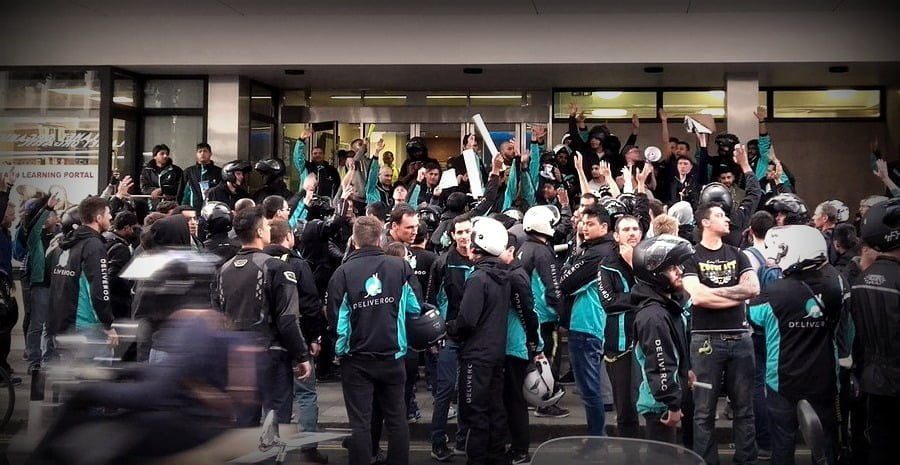Strike action by workers of the delivery firm Deliveroo has been successful in making the bosses reverse a decision that would have seen the couriers’ pay and conditions stripped back. In the process, a valuable lesson has been learnt for workers in precarious employment everywhere about how to fight back.
Strike action by workers of the delivery firm Deliveroo has been successful in making the bosses reverse a decision that would have seen the couriers’ pay and conditions stripped back. In the process, a valuable lesson has been learnt for workers in precarious employment everywhere about how to fight back.
The company planed to force the workers to sign a new contract, on pain of being fired if they refused, which would have seen their pay rates cut drastically from £7 per hour and £1 per delivery to a flat rate of £3.75 per delivery. This proposed ‘trial’ in pay was rightly seen as an attack by over a hundred of the workers, who walked out for six days in protest.
The gig economy
Deliveroo as a company is a part of the so-called “gig economy”. Fast-food outlets and restaurants which don’t hire their own delivery drivers can sign up to Deliveroo who will in turn charge the customer a rate for delivery.
We are told that flexibility is key to this new economic model: flexibility for food businesses, as they do not have to bother themselves with the hassle of employing staff; and supposed flexibility for the employees as they can work when they want. In reality, ‘flexibility’ for the employees means self-employed status.
This is a trick that has been used in the construction industry for decades, and which has become notorious in modern life thanks to other “gig economy” firms such as Uber. Such bogus self-employment is used to fire workers instantly without legal consequence, whilst allowing the bosses to skip on much of that pesky red tape that they love to complain about; inconveniences that get in the way of their profits, such as pension contributions, holiday and sick pay.
This new gig economy is simply another reflection of capitalism in decay. Unable to offer the conditions of the past we see further attacks, casualisation, lower pay, and no guarantee of work.
This recently attempted round of attacks by Deliveroo bosses was not because they suddenly found a renewed hatred towards their workers, but because of the market – i.e, capitalism. It is understood that Uber and Amazon, whose turnovers dwarf that of Deliveroo, will be entering the same market in which Deliveroo currently operates. This means that Deliveroo will be launching an aggressive expansion, which in total will double their turnover, to ensure they are not crushed when the big boys enter the market.
The logic of capitalism ensures that those who pay for the cost of this expansion are the workers. Amazon and Uber would likely sell below costs for a period to undercut and crush Deliveroo. Therefore, under capitalism, we see further attacks on workers – even beyond the precarious self-employed contracts – for Deliveroo to stay competitive.
#Boycott @Deliveroo! #MakeYourOwnDinner No #Slaveroo #LivingWageNow Support the Strike Fund: https://t.co/lmbhZSRghf pic.twitter.com/PUsFkn5geL
— IWGB Couriers Branch (@IWGB_CLB) August 13, 2016
Unity and action
The atomisation and isolation of workers in the gig economy, the fast-food sector, and other similar industries – combined with a certain conservatism and lethargy from the leaderships of the major trade unions in Britain in the past – has meant that workers who are forced to classify themselves as self-employed have been neglected and are not represented by the big unions, who are daunted by the challenge of recruiting, organising, and representing these workers.
This means that smaller unions and organisations, such as the Independent Workers’ Union of Great Britain (IWNG), have temporary filled the vacuum and achieved success in organising workers who are overlooked and currently by the larger unions. The success of the strike action by Deliveroo workers shows the way forward for workers to combat further attacks by the bosses: organisation, unity, and militancy.
Most importantly, the strike demonstrates that it is through struggle that workers become organised and gain a sense of their own strength, in turn inspiring those around them in other sectors to join the struggle also. This message should be taken to all unions, workplaces and communities. Strike action works. Militancy pays!
Yet, we should not be content solely with defensive wins, despite their importance for the union movement. We have a world to win, and to do so we need a political programme, with demands including:
- An end to all precarious self employment! No more zero-hour contracts!
- A proper living wage for all! Full employment with no loss of pay!
- For a decent life free of the toils of wage slavery altogether!
Socialist Appeal supporters are fighting for that socialist programme in the labour and trade union movement – and we believe you should join us in this fight!






